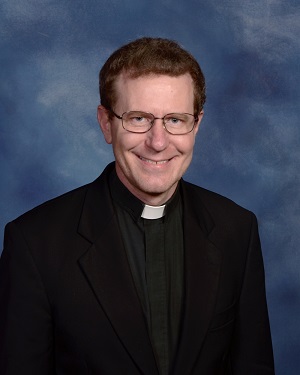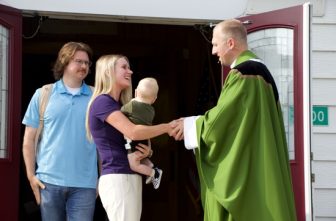On Sept. 11, Kim Williams and her family gathered in her dying mother’s home for a Viaticum Mass with Father Joseph Bambenek presiding.
In Latin, viaticum means “food for the journey.” In the Mass of the Catholic Church, it is the last Mass for a Catholic’s reception of the Eucharist before death. Father Bambenek — who performed the Viaticum Mass for Williams’ mother, Laura Harris— explained that the Mass is celebrated to help prepare the soul for the journey from here to eternity.
“The readings that typically go with, when it’s done in a Mass form, are the story of Elijah (1 Kings 19:8) eating bread and then going 40 days, being fed by the bread; a part of John 6 where Jesus makes most clear that he’s the bread of life; (and) there’s the reading from Paul’s epistles (1 Corinthians 11:23-26) where it most clearly explains the words that we use for the institution of the Eucharist,” Father Bambenek said.

A person receiving the Viaticum Mass is typically close to death. There are readings from the Old Testament, the New Testament, the Gospels and a homily. The Mass often does not have music, unless the family requests musicians, Father Bambenek said. If the person receiving the Mass is conscious enough, an opportunity is given to renew their baptismal promises.
Williams said she and her family experienced the uniqueness of the Viaticum Mass. The Mass, Williams said, deeply affected everyone in the room, and in ways that forever changed her faith.
“I wanted to make sure that she had the anointing of the sick and that peace, knowing that you’ve received that sacrament,” Williams said. “I didn’t know how much of it she would comprehend because she had dementia. … Even through her limited cognitive abilities, (it was important) to be surrounded by family and to get to have the privilege of a private Mass and to have that one-on-one time with the priest where she’s no longer just a member of the congregation at that point. She was the most important person to Father Joe. And I think that just really says something for how he sees ministry and how he carries out his priestly ministry.”
Williams said that in what was expected to be her mother’s final moments, Father Bambenek represented Christ to her mother. Williams said it was a powerful way for family to surround their loved one under the mantle of Christ.

Williams knows Father Bambenek from St. Pius X in White Bear Lake and got to experience Viaticum Masses with him as an employee of the parish, where she was the director of outreach and pastoral care.
“I was a little apprehensive,” said Williams, who is the operations manager at the Center for Mission, which supports missionary outreach for the Archdiocese of St. Paul and Minneapolis. “But honestly, that became one of my most treasured memories in pastoral care, just being honored to be present during those moments with families, to share in that.”
Father Bambenek, director of the archdiocese’s Office for the Renewal of Structures, said he learned about Viaticum Masses while serving as an associate pastor of Nativity of Our Lord in St. Paul. He was taught by Father Patrick Hipwell while at Nativity, who offered Viaticum Masses to those in need. Father Hipwell is now retired and living in the Leo C. Byrne Residence in St. Paul.
Together with Williams, they created a Viaticum Mass guide that organizes the prayers and rituals to make it easier for priests to perform the Mass in a smaller room.
In addition, while in the seminary, Father Bambenek heard from his classmates that Father Kevin Finnegan at Our Lady of Grace in Edina was offering Masses for a happy death, which uses different readings and different sets of prayers. St. Joseph is widely held to be the patron saint of a happy death.
“Time and time again, it’s just been an experience of peace for the person,” Father Bambenek said. “We can schedule it to get as many of the family that want to be there as possible. … Everybody can really see the beauty of the Church’s sacraments. They’re always beautiful, but this is at that point in time that their beauty becomes evident to more people.”
During one of the Viaticum Masses, Father Bambenek and Williams said the woman they were serving died a few prayers into the Mass. Before the Mass started, when Father Bambenek walked into the room, a single tear trickled down her face. And when she died, she smiled peacefully.
“I’ve never seen such a peaceful smile on anybody’s face,” Williams said. “Father Joe and I had talked about it and we’re thinking, ‘Well, she must be seeing Jesus.’ To be present in that tender final moment has profoundly and forever changed who I am. Not only as a pastoral minister, but as a person.”
Father Bambenek said of the experience, “She was just transfixed looking at me. … We talk about how the priest is in persona Christi during Mass. That was probably the most lived experience I’ve had of that, where the people, the person, is obviously not joyful at seeing me, but joyful at seeing Jesus in me. These are some of the most powerful experiences I’ve had as a priest.”
Viaticum Masses are part of the Church’s liturgical foundation, Father Bambenek said. The prayers can be found in the Roman Missal. Though common to Father Bambenek’s priestly duties, he noted that the Viaticum Mass is an optional practice.
“We may have heard of it in seminary, but until you’re in the field, there’s a lot of stuff that in seminary seems abstract,” Father Bambenek said.
Father Bambenek said that both the Viaticum Mass and the Mass for a happy death are reminders that there is something bigger and better beyond what we can see now.
“It’s a comfort for the person, but it also can be a comfort for everybody else,” Father Bambenek said. “We each approach the reality of death differently, and sometimes it’s the hardest for the person (who)’s about to pass. But sometimes it’s actually harder for the people around them, depending upon all sorts of circumstances. The beauty of the sacraments is that God gives us the grace in whatever situation we’re in. It’s an opportunity for God’s grace and peace in those difficult times.”




